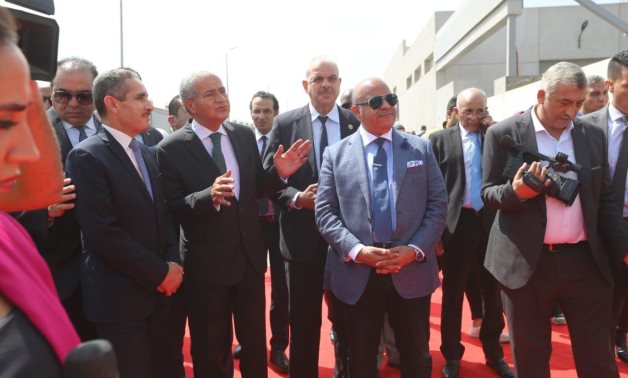
Dr. Ali El-Meselhi, Minister of Supply and Internal Trade laying the foundation stone for two expansive "logistics/commercial" areas - Press Photo
A comprehensive effort is ongoing to restructure and optimise Egypt's domestic commerce sector, guided by the political leadership.
Major General Hesham Ameen, Minister of Local Development, Ambassador Soha Gendy, Minister of State for Migration and Egyptian Expatriate Affairs, Major General Gamal Nour El-Din, Governor of Kafr El-Sheikh, Dr. Tarek Rahmi, Governor of Gharbia, and Dr. Ibrahim Eshmaawi, Assistant Minister of Supply and President of the Internal Trade Development Authority took decisive action.
This distinguished group lay the groundwork for two enormous "logistics/commercial" zones encompassing 22 acres in the Kafr El-Sheikh Governorate. These cutting-edge facilities will house a variety of businesses, including wholesale commerce, packaging and labeling, cold and freezing storage, as well as recreational, social, educational, administrative, and other necessary activities.
These advances are in line with the political leadership's priorities of developing and improving Egypt's domestic commerce sector.

The logistics zones in Kafr El-Sheikh Governorate, according to Minister El-Meselhi, will involve the construction of a project with commercial, administrative, and logistical activities, with investments ranging from 5 to 6 billion Egyptian pounds.
He also mentioned that several investment opportunities had already been provided in several governorates over the years, aligning with the government leadership's orders to establish logistics, commercial, recreational, and service zones targeted at delivering basic goods and other products.
These logistics areas and multi-activity commercial centers, which include strategic storage facilities, will help reduce the trading cycle and minimize waste and loss in product distribution, especially given that transportation costs account for nearly 10 to 15% of the final product price.
The development of such logistical and commercial zones, as well as distribution and sales outlets, will minimize transportation costs, benefiting consumers with lower final pricing.
The minister emphasized that people of Kafr El-Sheikh Governorate will be given priority in job prospects for these initiatives.
He stated that collaboration between the Ministry of Supply and the Kafr El-Sheikh Governorate, in addition to the developer, will add considerable value to the governorate's expansion of logistics and commercial areas.
He further stated that a strategic plan for the development of domestic trade across the country has been established in accordance with His Excellency President Abdel Fattah El-Sisi's directions, with numerous similar areas currently being implemented in other governorates.
Minister El-Meselhi emphasised the ministry's commitment to eliminating any barriers that investors may face in implementing logistical projects and growing important commercial activities.
He emphasised that new investment prospects are being presented with full amenities on the project site, as well as aid in getting licences, to allow investors to carry out their agreed-upon projects smoothly and without hindrances. Dr. Ibrahim Eshmaawi, Assistant Minister of Supply and President of the Internal Trade Development Authority, stated that the development of logistics, commercial, recreational, social, administrative, educational, and service areas in Kafr El-Sheikh Governorate will result in the creation of approximately 20,000 direct and indirect job opportunities.
These areas will encompass diverse business activities, along with service and administrative offices, storage yards, hypermarkets, and shopping centers. The project is scheduled to be inaugurated within 36 months from now.
Furthermore, Eshmaawi stated that the Internal Trade Development Authority has developed an ambitious investment map for various logistics and commercial activities, aiming to fulfill all commercial, marketing, and service requirements for each governorate. This plan is based on thorough studies and assessments of market demands and consumer needs in each governorate. It aims to ensure the efficient distribution of goods, reduce transportation costs, and provide convenient access to essential products and services for residents.
The logistics and commercial zones in Kafr El-Sheikh Governorate are part of an overall initiative to enhance Egyptian domestic trade. By establishing these zones, the government hopes to foster business activity, attract investment, and offer job opportunities for the local populace.
The project will comprise wholesale trade centers, packaging and labelling services, cold and freezing storage facilities, and administrative offices to support trade activities. There will also be recreational, social, and educational facilities to improve the overall quality of life in the neighborhood.
Minister El-Meselhi highlighted that the development of these logistics and commercial zones will contribute to reducing the trading cycle, minimizing product waste and loss during distribution, and ultimately leading to lower prices for consumers. Transportation costs, which can significantly impact the final product price, will be reduced by establishing storage and distribution facilities within close proximity to the market.
The government is committed to assisting investors and ensuring that these projects are implemented smoothly. They will provide full facilities at the project sites, aid with license acquisition, and address any issues that may arise. The goal is to establish an appealing investment climate and to make it easier for large commercial activity to expand across the country.
Overall, the construction of logistical and commercial zones in the governorate of Kafr El-Sheikh is part of Egypt's larger attempts to boost domestic trade, increase supply chain efficiency, and drive economic growth. These measures will help not only businesses and investors, but also the well-being and prosperity of local communities.
Egypt hopes to increase its domestic trade capabilities, improve supply chain efficiency, and attract investment in important areas by implementing these policies. These activities not only help to economic growth, but also create job opportunities, boost competitiveness, and increase overall population well-being.
Comments
Leave a Comment